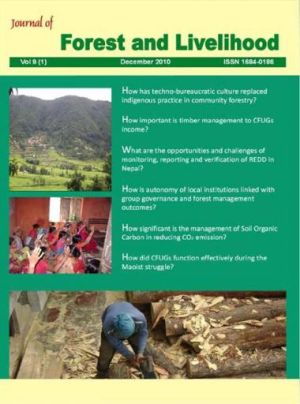Maoist People’s War and Community Adaptation: A Case of Community Forest User Groups Nepal
DOI:
https://doi.org/10.3126/jfl.v9i1.8594Keywords:
conflict, adaptation, threat, vulnerability, livelihoodsAbstract
The ten year long armed conflict between the state and the Maoists in Nepal had tremendous impact on all sectors and communities in the rural area. However, based on the study of three Community Forest User Groups (CFUGs) of Eastern Nepal, it is argued that CFUGs were less vulnerable than other rural institutions. The paper further discusses how CFUGs adapted their coping strategies and functioned more effectively than other village level institutions during the conflict period. It was observed that due to adjustments of the Maoists agendas for CFUGs planning, such as issues surrounding poverty reduction, social inclusion and caste/ethnic/gender-based discrimination, the Maoists did not adversely affect the CFUGs.
DOI: http://dx.doi.org/10.3126/jfl.v9i1.8594
Journal of Forestry and Livelihood Vol.9(1) 2010 57-61
Downloads
Downloads
Published
How to Cite
Issue
Section
License
CC-BY-NC: This license allows reusers to distribute, remix, adapt, and build upon the material in any medium or format for noncommercial purposes only, and only so long as attribution is given to the creator.





